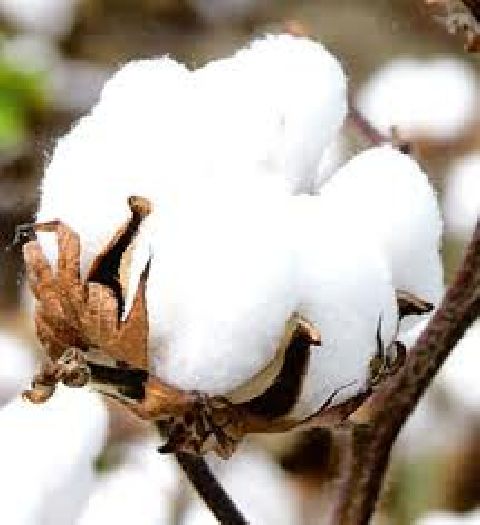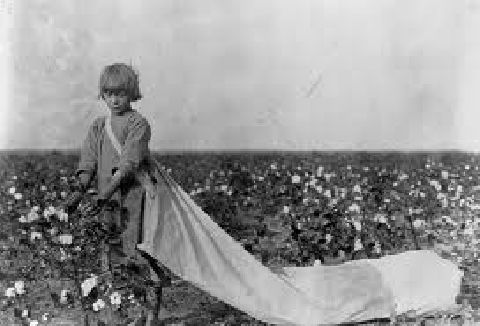"SHUG" - A Tribute to My Mother -
Shug
My Mother
The cotton fields of Arkansas were too small to hold her dreams,
Too bleak to hold her hopes
Her soul heard music, poetry, drama
Her mystic intuition
Told her of stars waiting to be touched
But her eyes
saw only endless rows of cotton
Waiting to be picked
Her little girl fingers, more suited to
an artist’s brush, a poet’s pen, or writer’s pad
Were torn, pierced and bloodied by the sharp, dry husks
Of an infinity of cotton bolls waiting to be picked
In those long ago fields of Arkansas
She went to school when “Papa”
had no need for help in the fields
And occasionally rode with him in the wagon to Ft. Smith
Always hoping that this would be the time
He would allow her to go with him into the store
Somewhere, sometime, someone called her “Shug.”
We never knew why
When asked, she said only
(with a coy smile)
“I don’t know, I guess because I was so sweet.”
She delighted in the mystery thus created.
She escaped those despised fields of cotton that had
devoured her childhood
To become a life long companion/partner/friend
to her handsome “Jack”
A Texas Ranger pronounced the words that bound their life together
Through valleys, mountains, gardens, deserts, and death
Her strength was a match for his, though expressed
In different ways
Her promotions, affirmations, and calls to higher duty
were the hugs and kisses of sticky fingered children
Presenting her occasional tokens of their love or
asking her to heal some hurt
She triumphed over myriad desolations that would have defeated
weaker women
And deep within her the little girl in her never lost sight
of the stars she knew existed just for her
With her eyes firmly fixed on their promise and
fueled by an indomitable will
Born in those long ago
Endless fields of Arkansas
She prevailed where others fell
Charming, provocative, guileful, loving, malicious
“Shug,” “Mother,” “Mom”
Yes, all those and more
She fit no pigeonhole
And in the end, when the time came she departed with grace, love, and dignity
To rejoin her “Jack”
and take her place among her stars.
*************************************************************
ADDENDUM:
I can think of only one other instance in the English language when the simple syllable “sug,” when pronounced “shug,” is used other than to say “sugar.” That other example was a name: my mother’s name. But that wasn’t her “given” name, it was a nickname. Her real name was Melvina Adeline. A few, very few, people called her “Addie” or “Adeline.” I never heard anyone call her “Melvina” and I suspect they would’ve gotten an earful of feedback from Mother had they done so.
Mother, and by her choice, I always addressed her as “Mother.” It was probably a throwback to her ancestral Scotch/ English way of referring to one’s mother, but she was called “Shug” by one and all. But why or how someone tagged her with that nickname is a secret that was never revealed. I asked her many times. Her response was always a Mona Lisa sort of smile followed by the coy comment, “Oh, they called me that because I was so sweet.” But the way she said it, and that smile, told me that wasn’t the reason at all. But her nickname and the secrecy of its origin wasn’t the only enigmatic thing about Mother.
She had very little formal education. The nearest town until she was in her late teens was “Figure Five, Arkansas.” Her “Papa,” my Grandpa,“ was a share-cropper. Cotton was the most important money crop and “Papa” pulled her out of school every time the cotton in the fields was ready to be picked. He took her out of school permanently sometime around her 6th grade.
There was a reason why only slaves and destitute white people harvested cotton. When that fluffy cotton you see when you buy cotton balls in a nice plastic package, is ready to be picked it is “nestled” in a leathery “boll” protected from predators and picking fingers by sharp points.

A Ripe Cotton Boll
It takes the fruit of thousands of cotton bolls to fill the long sack that “cotton pickers” sling over their shoulders and drag behind down the dusty rows of ripe cotton.

A Child's Cotton Picker Sack
Years later, if we happened to drive past a field of ripened cotton Mother, with as much hatred in her voice as I ever heard, would say something like, “That miserable old cotton.”
“Papa,” a grandpa I never knew, was by all accounts a strange person. Mother said that he would sometimes load up all his kids in the wagon and strike out for Ft. Smith. There were times, she told me, when they would get part-way there and he would say, “Oh, let’s don’t go, chaps.” (He called his children “chaps.”) With that he’d turn the wagon around and go home with a disappointed bunch of kids –who dared say nothing- behind him. On the occasions when he actually made it to Ft. Smith he sometimes parked his wagon, turned to his kids and said, “You chaps stay here. I’ll be right back. They would sit in the wagon bed until he came back, after which he started the team and returned home – his “chaps” never setting foot on the streets of Ft. Smith.
My grandma, was no better in the “parenting” department. Her psyche was that of a very strait-laced, pleasure-despising woman. Mother called her a “Hard Shelled Baptist.” Grandpa was a musician. He played Cornet and Drums. After marrying “Belle McNabb” he never played either one again. What little I remember of Grandma Beavers is a memory of a very mean-spirited, joyless old woman.
When Mother was in her late teens “Papa” took his family to Texas where they ran a boarding house serving workers in the newly-discovered oil fields. While serving food Mother met a handsome, stocky, muscular young man named Willard S. “Jack” Carriker. After due courtship they were married by a Texas Ranger and set up housekeeping in a canvas tent with a wooden floor in the burgeoning oilfields near Ranger TX.
The oil field life had no appeal for Mother so after several months in that environment during which time she gave birth to a son, she announced she was pregnant again. She also announced with equal inevitability that she would not give birth to another child in a tent. This may have been Dad’s first encounter with Mother’s strong will. It was the almost-immovable object yielding to a true irresistible force. They moved back to Arkansas and settled into a log cabin located “cheek by jowl” to the elder Carriker house.
For the next twenty years or so, Mother gave birth to three more children, one girl and four boys. (I came along much later.) They moved numerous times with Dad following work in the oil fields of OK. While Mother kept a decently clean house I’ve been told many times that she was always ready to “drop everything” and play with her kids. She was also a master “story-teller,” either from her past life or making them up as she went along.
Her life was pleasant until “The Great Depression” struck. Dad became one of the chronically unemployed and Mother had to learn to cope with stark poverty. There were days when oatmeal was the only food in the house. There were occasionally worse days when there was no food in the cupboard. More than once a bag of groceries would be left anonymously, probably by church members, next to the front door. They lived in a succession of oil field “shacks” that were unoccupied and “free for the taking.” Unable to feed her family well and keep them in well-clothed took a terrible toll on Mother. After a few years Dad got steady work with Sinclair Oil Company, but he had to be away from home weeks at a time. By this time I was a toddler and we lived in a “rustic” house about 3 miles outside town.
Mother became a single parent with six kids to feed, clothe, discipline and get off to school. Since Dad had to have money for room and board when he was away from home he couldn’t leave any money with Mother. She had a charge account at a store that sold groceries and limited clothing. Dad had our only car so when she needed something from town she walked and pulled a child’s wagon behind her. No pioneer woman, no pilgrim woman, no refugee, ever endured more hardship than my Mother contended with - and through her indomitable strength, will and faith – she prevailed.
I remember little of all that I’ve written above, but I know it is true. By the time I became totally aware of where I lived and what my life was like, Dad had been promoted and we had moved to a small town in Southeastern Kansas. My siblings had all “left the nest” and I was an “only child.” I remember Mother as a warm, affectionate person who could also bring painful wrath to bear on my butt when I “did wrong.” Perhaps the warmest memory I have of Mother is this: I was in high school by this time. Small town, all of us went home for lunch. Almost without exception when I walked through the front door I would hear “Bob Wills” music coming from KVOO in Tulsa OK. As I walked into the “family room” I would see an attractive plate of food on a table covered with a tablecloth. Mother would then sit down with me while I ate and we would talk.
I also have the memory of Mother kissing me goodnight before I went into my bedroom – every night until I was in my late teens. I might have been embarrassed had one of my friends been there, but I liked it.
The final and most terrible blow that my Mother had to absorb, accept, and go on came on April 1, 1944. Her second-born, my brother Rudy, was Killed in Action aboard a B-24 bomber while returning from a bombing mission over Germany. With Dad by her side she weathered it and again she prevailed.
Of course she had faults. She died peacefully, apparently in her sleep, in 1986. As confident as I am that God is in control, that confident I am that she is either in heaven or will be one day.
April 2012
Don Carriker, Sr.
A loving son
About the author
Comments 4
Don, this is so beautiful I have no words. What a phenomenal tribute to an incredible life lived and the woman who lived it. Awesome!
Well done Don! Those who lived through times like those may wish to not remember, it is important for we who follow to not forget, an excellent tribute.
Brought tears to my eyes, Don. I'm sure she'll greatly enjoy reading it, if she hasn't already (are they aware of us down here, do you think???)
I appreciate your sharing my feelings, Susan, and, yes, my faith tells me that "we" (those in heaven and we who are still on Earth) are in "communion" with one another. Of course we never hear them with our ears or see them with our eyes but communication,even on Earth, doesn't always require sight and/or sound.




